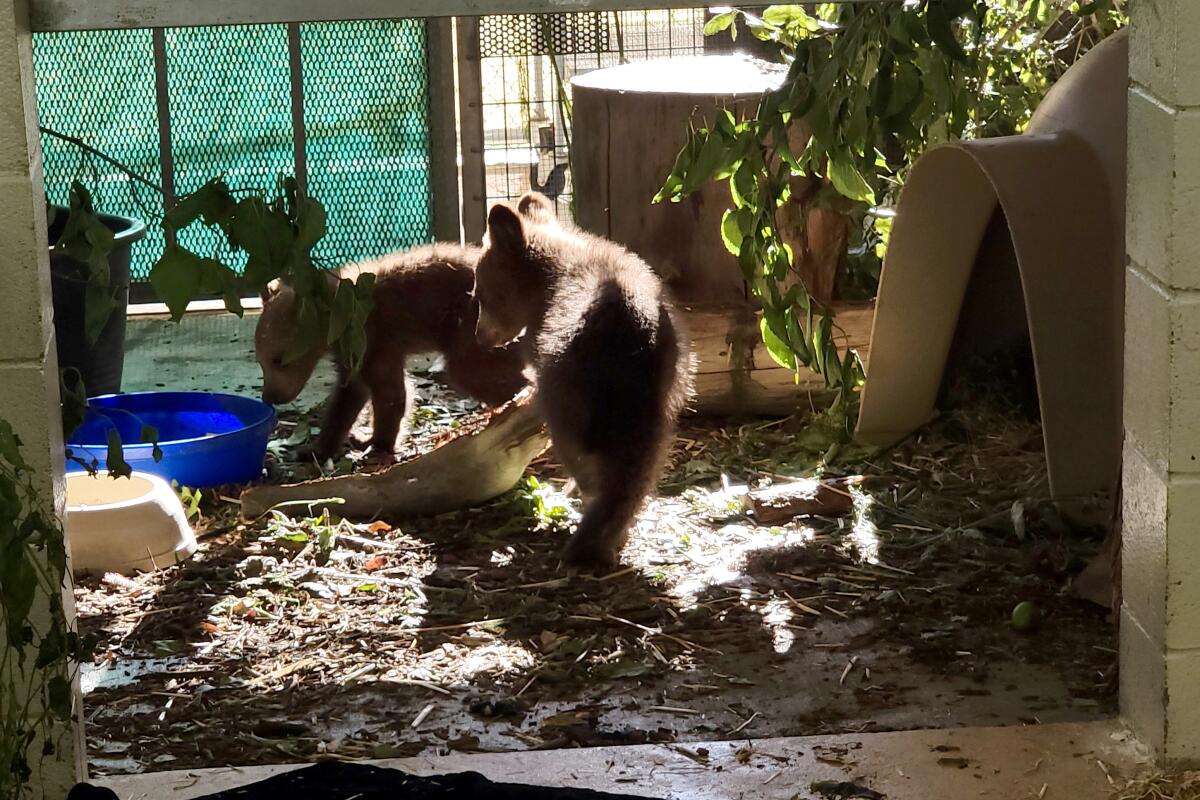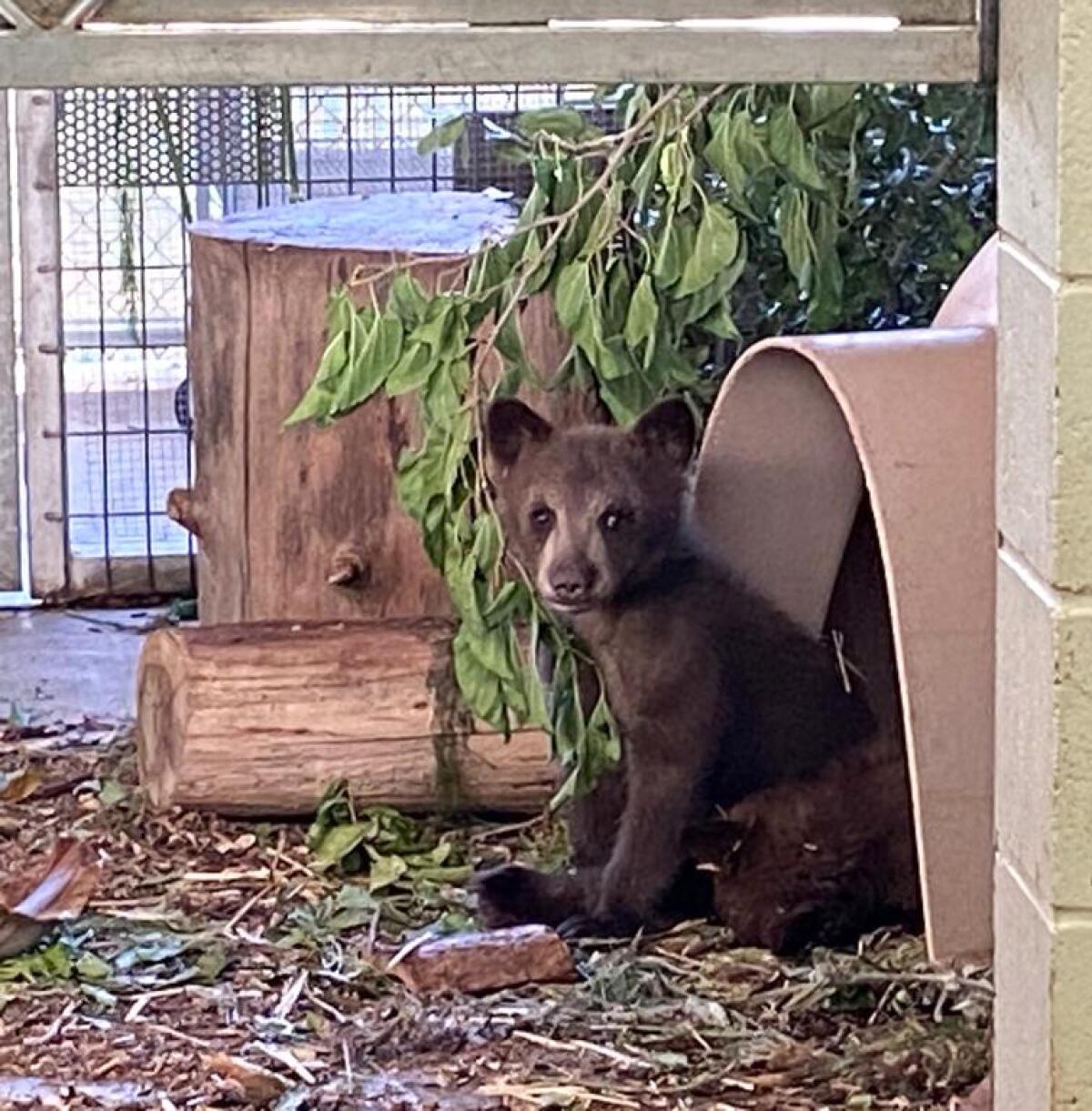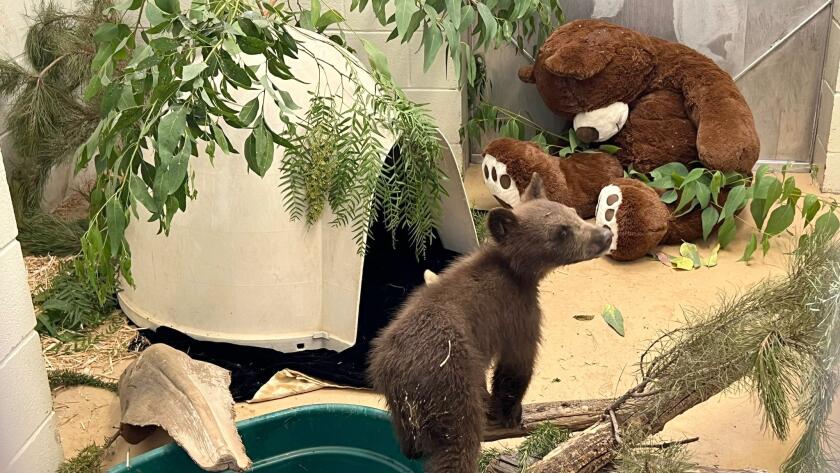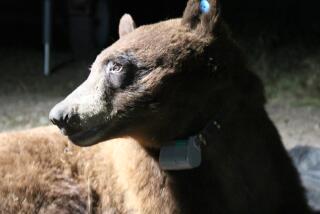Orphaned brother bears find a new home in San Diego while authorities investigate report of bear shooting
Humane society officials hope to release the orphaned bears back into the wild early next year. Separately, authorities are investigating a report of a shot bear.
While the San Diego Humane Society welcomed a pair of orphaned black bear cubs, authorities are investigating the possible shooting of an unrelated adult black bear in the San Bernardino National Forest.
One of the two orphaned cubs was discovered in the San Bernardino National Forest by a local resident, according to the California Department of Fish and Wildlife. The cub was found near the body of its dead mother, but the cub refused to leave, officials said.
When biologists with the state wildlife department tried to capture the cub, they heard it call out to another bear somewhere in the forest. The first cub was captured on July 4 and three days later, biologists learned that a second cub was spotted in a tree.
That second cub was eventually captured after biologists set a trap with oranges, apples, sardines and a sweet roll, according to an Instagram post from the agency.

At just five months old, the brother cubs are too young to be left alone in the wild, officials said. Bear cubs typically are attached to their mothers for at least 17 months before theyâre strong enough to venture out into the wild by themselves.
The mother bear was dead for some time when biologists discovered her and the cause of death has not been determined, according to a Fish and Wildlife spokesperson.
The San Diego Humane Society welcomed the cubs on July 7 to its Wildlife Center in Ramona. The cubs will undergo a targeted rehabilitation to make sure they can be reintroduced back into the wild, the human society said in a news release. That includes a more hands-off approach with minimal human interaction. The cubs will also be provided with an environment that resembles the forest with oak, pine, clover, mulberry branches, fruit tree branches, mulch, humming bird sage, sumac, chamomile flowers and herbs, the humane society said.
Next, the bears will be examined while they are anesthetized and then moved to a larger enclosure to give them room to exhibit more natural behaviors, according to the news release.
âOur goal now is to raise them with limited to no human interaction and get them ready to return to the wild,â campus director Andy Blue with the humane society said in a statement.
The bears are expected to be released back into the wild early next year.
The orphaned cubs were separated before they were reunited at the wildlife center. When they found each other again, they started to vocalize and re-bonded with each other, according to officials with the humane society.

In another part of the San Bernardino National Forest, wildlife officials are searching for an adult black bear that may have been shot this week.
Itâs unclear what happened to the bear, but residents in the Angelus Oaks community reported in a Facebook post that a resident shot a black bear on Monday after it became aggressive. There was no other information about the interaction and whether the person who shot the bear has been questioned by authorities.
Resident Trisha Ramsey wrote in her post that the black bear passed through the community on numerous occasions and never appeared aggressive. But Ramsey also reminded people to not feed bears and to leave them alone.
âFirst time Iâve ever seen him out in the daytime,â Ramsey wrote. âNot bothering anyone, just out for a stroll.â
Fish and Wildlife Capt. Patrick Foy said the agencyâs law enforcement division is investigating the report of a shooting, but canât confirm if a bear was shot.
âSince we donât have a bear in hand, we canât say for sure,â Foy said in an interview. âWeâre taking it very seriously and we believe itâs a legitimate report.â
Bears have an incredibly strong sense of smell and follow the scent of food wherever it might take them. That includes garbage, pet food left outside, grease on a barbecue grill and fallen fruit.
An important takeaway is for people to fight the urge to feed wildlife or try to interact with the animals, Foy said.
âOur overall mission is to help the citizens of California better coexist â not only with black bears â but all of wildlife that lives around us,â Foy said.
More to Read
Sign up for Essential California
The most important California stories and recommendations in your inbox every morning.
You may occasionally receive promotional content from the Los Angeles Times.











